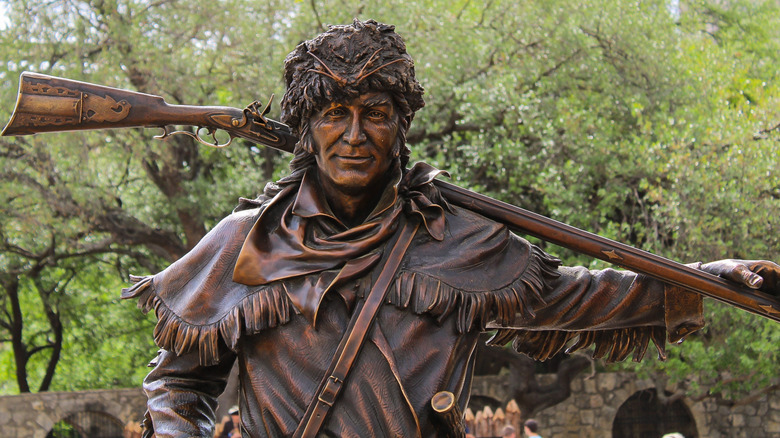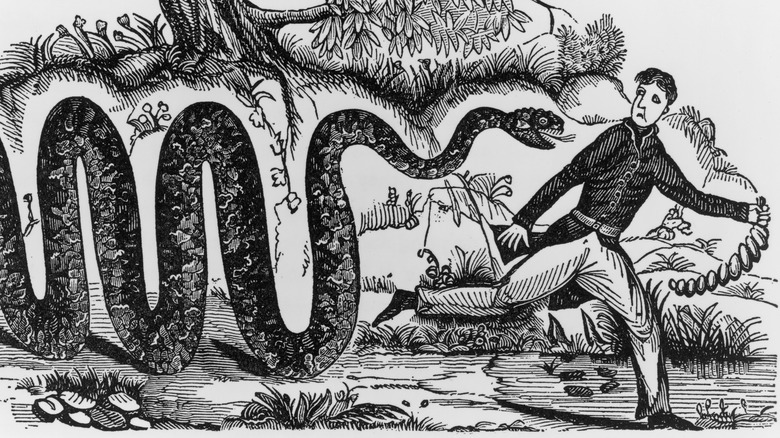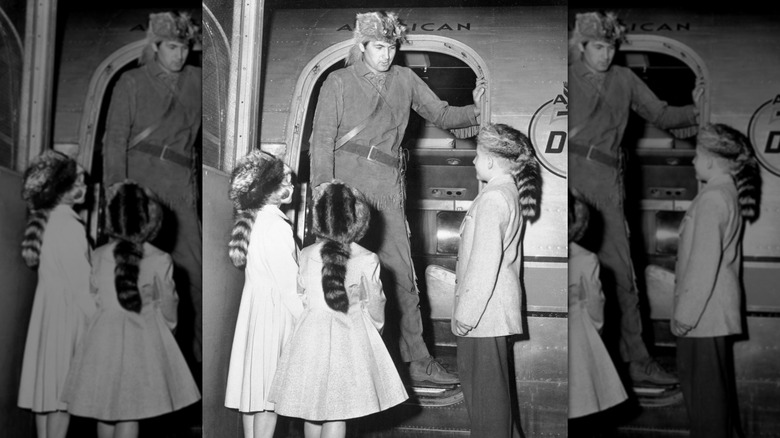The Chilling Words Of Davy Crockett's Final Letter
In their final days and hours, the defenders put pencil to paper, recording their thoughts for friends and loved ones to reveal what taking part in the Alamo was really like." They may not have expected imminent death — the garrison anticipated that their fellow Texian rebels would relieve them before they were attacked in earnest — but nearly two weeks of military besiegement will weigh on anyone's mind. Surviving missives carried from the fortress by couriers reveal hopes for the future of Texas, bitterness over the course of the revolution, and a creeping sense of what their fate might be. The young commander William Barret Travis, in whom leadership had inspired a heretofore unseen eloquence, pleaded in a final letter to the friend who watched his only child, dated March 3, 1836: "Take care of my little boy" (via Nevada Technical Associates, Inc.)
No such final word written behind the walls of the Alamo survives from perhaps its most famous defender, Davy Crockett. So far as we can tell, the colonel who never did go by "Davy," one of the many lies about Crockett everyone believes – wrote no messages during the 13 days he spent in the fortress. His last letter was penned on January 9, 1836 (per the Texian Legacy Association), months before Crockett had ever set eyes on the mission-turned-battlement that was to be his last stand and grave. Where Travis wrote concerning the fate of his son, Crockett wrote directly to one of his children. And he wrote, not of death or of settling affairs, but of the hope and promise he felt awaited him in Texas. "I am rejoiced at my fate," wrote Crockett. "Do not be uneasy about me, for I am with my friends."
Crockett's final message spoke to his hopes of reinvention
Davy Crockett seemed ecstatic about Texas when he wrote to his children in January 1836. "It is the garden spot of the world," he wrote. "The best land and the best prospect for health I ever saw is here, and I do believe it is a fortune to any man to come here." And in all likelihood, he was as enthusiastic as he claimed; Crockett was a warm, honest, and jovial character. But he came to Texas on the heels of a brutal defeat. As an independent-minded congressman, Crockett had approached the pinnacle of American political life when the Whigs courted him as a potential presidential candidate. But when he lost reelection in 1835 (per Texas Monthly), his allies abandoned him and his prospects for another office appeared bleak.
Texas was for Crockett, as it was for so many Americans, a chance to remake himself. The example of fellow Tennessean Sam Houston – who had gone from disgrace to dignified success after moving down Mexico way — may have helped push Crockett to pull up stakes. By the time he arrived, the Texas Revolution (which was pretty messed up) was underway, and he quickly joined the volunteer militia. But Crockett's goal and expectation was to become a leading figure of an independent Texas politics, not a fighter. In his last letter, he wrote that "All volunteers is entitled to a vote for a member of the convention, or to be voted for, and I have but little doubt of being elected a member to form a constitution for this Province."
Crockett's last letter was to his children (and not his wife)
The recipient of Davy Crockett's final letter was his daughter Margaret and her husband, Wiley Flowers (per Texas Monthly). Margaret was the youngest of Crockett's children by his first wife, Mary "Polly" Finley, who had died in 1815 (per History). In the letter, Crockett included a brief mention of his other children by Finley, sons John and William Crockett. He told Margaret that it was "not convenient at this time for me to write to them," but that he hoped she would share his letter with the boys.
Left unmentioned were Crockett's three children by his second wife: Robert, Rebecca, and Matilda. Nor did Crockett make any mention of his wife Elizabeth. Besides his collapsed political career, Crockett was also fleeing domestic strife when he went to Texas. Per "Three Roads to the Alamo: The Lives and Fortunes of David Crockett, James Bowie, and William Barret Travis" by William C. Davis, Crockett had never been particularly close with his second family, and after an embarrassing accusation about his management of his father-in-law's will, he ended up estranged from Elizabeth. It was reportedly an amicable separation, but the two were not living together when Crockett left for Texas, and he left the care of his second family to Robert, who was 19 by then. They received no final message from Crockett before his death.


